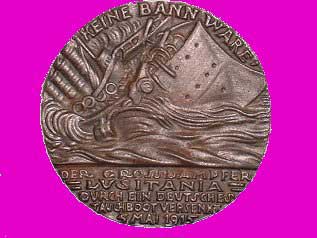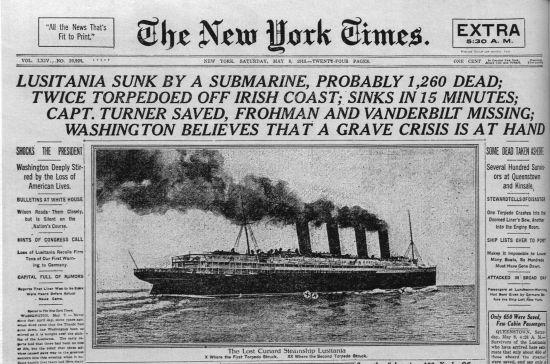Michael Byrne was horrified at what he saw. 'The bodies of infants laid in lifejackets, and floating around with their dead innocent faces looking towards the sky.' As he swam towards the tiny floatila of lifeboats and debris floating a short way away from the site of the wreck, he had to push them aside like 'lily pads on a pond.' Parents tried in vain to hold their children out of the water. Bellboy Ben Holton, who was clinging desperatly to a dog kennel remembered seeing a man pathetically pushing an infant along in a lifebelt, doing his best to keep him alfoat. Many people had already lost children, one woman had her baby torn out of her hands by the force of the water. All over the water were scenes of sadness. One woman had lept from Lusitania with her three young children. By the time she was pulled into a lifeboat, the third child had died.
Luckily for those thrashing about in the water or the others shivering in lifeboats, help was at hand. As soon as Vice Admiral Coke heard the SOS, he sent the HMS Juno to Lusitania�s aid, but before it got there, already a small fleet of merchant vessels, fishing trawlers and other small ships were picking through the wreck.
In Germany, the sinking was applauded, but almost everywhere else in the world, from the time the torpedo left the U-20, Walther Schwieger was the most hated man on earth. When Germany saw how the world reacted to the sinking though, they back tracked and claimed the sinking was an accident.
American president Woodrow Wilson wept when he was told of the sinking. Both sides used the sinking for propaganda. Irish soldiers entered the war against Germany due to posters showing the sinking ship. A medal was struck in Germany showing the sinking ship and congratulating the German government. One medal found it's way to England, and was translated to show what the Germans thought of the sinking in a bid to promote hatred of the country.
In 1993, Robert Ballard, Ken Marschall and Eric Sauder went down in Delta, a tiny submersible in order to study the wreck and find what caused the massive second explosion. They found the ship in ruins. Holes pocketed the wreck and the superstructure had slid down into the muddy bottom of the sea. She had been used by the British as target practice in war games, and now is deteriorating at a rate faster than Titanic.
Robert Ballard had heard rumors that have persisted since the sinking about contraband munitions in the hold of Lusitania, and a type of ammunition that explodes on contact with water! Instead of contraband though, Ballard found evidence the torpedo hit a near empty coal bunker and ignited the highly combustible coal dust there, which in turn blew the side out of the ship.
Lusitania approaches the 90th anniversary of the sinking, but forever she will sail in hearts and minds like ours. May she and her innocent victims taken in war rest in peace. |




